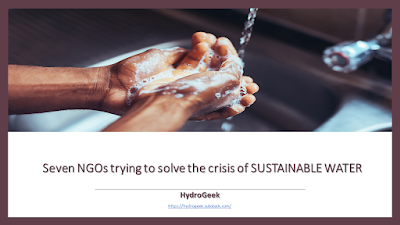Humans have exploited water resources just like other natural resources. Day by day, due to the scarcity and uneven distribution of water all over the World, "many fear that future wars could be fought over water".
Natural water bodies such as rivers, lakes, and ponds are sources of drinking water that also help to control floods, support biodiversity and regenerate groundwater. The population of the World is already facing a severe water crunch. But this population is constantly growing and thus the situation will worsen by 2030.
The government of many countries is trying its best but economic constraints, as well as various political conspiracies, prevent the overall development. That is why they create various funds and made them available to Non-Governmental and Non-Profit Organizations(NGOs). They have the capacity to directly channel the resources received from the government and utilize them for water conservation.
This article identified seven NGOs for their exemplary work in the field of water management as examples to encourage others. Their work in the field of freshwater management, drinking water supply, social awareness, water conservation in fisheries, ensuring basic rights to access clean water, assuring water sanitation for everyone, restoration of water bodies, etc. can enlighten others to start their own NGOs/NPOs to "make the world water sustainable".
1. Environmentalist Foundation of India
Mainly works in "freshwater management"
This organization’s primary focus is on reviving freshwater habitats such as lakes and ponds across the country. After several attempts and analyses based on the outcome of the attempts, the Environmentalist Foundation of India (EFI) has concluded that it can revive contaminated freshwater bodies in India only through "scientific means". EFI works in rural hinterlands as well as urban settlements and has successfully revived multiple surface water bodies since 2007.
2. Wateraid
Mainly works in "drinking water supply"
WaterAid started in 1981. They are determined to make clean water; reliable toilets and good hygiene normal for everyone everywhere within a generation. Since March 2020 Wateraid has scaled up its work in 30+ countries to respond to the Coronavirus pandemic. This rapid-response work – building on their strong track record in providing critical water infrastructure – is how people can change their lives for good.
3. Centre for Aquatic Livelihood (Jaljeevika)
Mainly works in "water conservation in fisheries"
Jaljeevika has played a vital role in water conservation and helping fish farmers in states like Andhra Pradesh, Madhya Pradesh, Maharashtra, and Jharkhand. It teaches them sustainable fishing methods while also conserving water. Fishery cooperatives have been encouraged to adopt new technologies, and better management practices to enhance their livelihood.
4. Project WET
Mainly works in "social awareness"
Although many people are unaware of the magnitude of water problems throughout the world, Project WET is helping inform people at a young age through its programs. Through instructional materials, they help educators teach students about important water concepts such as managing and protecting water resources.
5. Clean Water Action
Mainly works in "basic rights to clean water"
For 40 years, Clean Water Action has promoted legislation to protect water resources in the United States including the Clean Water Act and the Safe Drinking Water Act. They continue to work to close legal loopholes to prevent pollution of freshwater resources. In California, they are promoting legislation to allow the public to anonymously request well-log data.
6. We Are Water
Mainly works in "water sanitation for everyone"
The We Are Water Foundation is an initiative of Roca Group, the world leader in bathroom spaces, with a presence in more than 170 countries. Since its establishment, it has been committed to the environment, both in the development of its products and in its production processes.
7. Bhumi
Mainly works in "restoration of waterbodies"
The “Revive Lakes” project by the NGO Bhumi was started with the aim of cleaning and restoring the lakes and other water bodies. They bring drying and dying lakes back to life and help the people of Bengaluru fight the shortage of water.
We have selected the above organizations based on their role in water sustainability and the significance of their work in water conservation. You may have your choice. You may recommend and highlight encouraging works on water done by other foundations as well. Use the Recommend tool for the same.
That's all for now.
